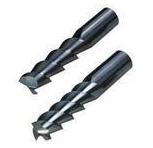 The latest trends in machine tool development are all about speed, precision, and quality. As machining speeds continue to rise, the demand for high-quality surface treatments on molds, cutting tools, and machine components has never been higher. Extending tool life, reducing manufacturing costs, and maximizing profitability remain top priorities across the industry.
To meet the challenges of high-speed machining and reduce both time and expenses, continuous improvements in tool technology have become essential. Tungsten carbide tools are gaining more market share due to their exceptional hardness and wear resistance, making them ideal for demanding applications.
Choosing the right surface treatment is crucial to achieving optimal performance. For medium and heavy-load molds, CVD (Chemical Vapor Deposition) titanium plating at high temperatures, combined with precision vacuum heat treatment, is recommended to control deformation. This method is widely used in cold forging dies, hydraulic drawing dies, tungsten carbide drawing lines, and suction pipes. On the other hand, for tools and components under low or medium load, or those requiring high precision, PVD (Physical Vapor Deposition) titanium plating at lower temperatures (150°C to 500°C) is a better choice.
Aluminum titanium nitride coatings with high aluminum content can form an aluminum oxide layer on the surface of the hard film. This oxide layer significantly increases the oxidation temperature of the ceramic coating to 923°C, offering excellent protection against oxidation at high cutting speeds and maintaining high-temperature hardness. However, titanium nitride and titanium carbonitride also produce titanium oxide films at high temperatures, but these layers tend to flake off during machining, leaving the hard coating vulnerable to rapid oxidation and degradation. Therefore, regardless of whether using high-temperature or low-temperature coatings, it’s essential to select the right substrate, ensure stable heat treatment, and perform proper surface preparation such as fine grinding and polishing to enhance overall performance.
Ultra-high temperature resin-bonded diamond grinding wheels may not be as efficient as METROX wheels, but they offer strong bonding strength, shorter production cycles, and lower processing costs. They are especially effective when grinding tool edges, as they minimize chipping. Additionally, they can be shaped into various forms based on specific application needs, which is why they have remained widely used in production for many years. Today, improving the grinding performance of these wheels continues to be a key focus for manufacturers looking to stay competitive.
The latest trends in machine tool development are all about speed, precision, and quality. As machining speeds continue to rise, the demand for high-quality surface treatments on molds, cutting tools, and machine components has never been higher. Extending tool life, reducing manufacturing costs, and maximizing profitability remain top priorities across the industry.
To meet the challenges of high-speed machining and reduce both time and expenses, continuous improvements in tool technology have become essential. Tungsten carbide tools are gaining more market share due to their exceptional hardness and wear resistance, making them ideal for demanding applications.
Choosing the right surface treatment is crucial to achieving optimal performance. For medium and heavy-load molds, CVD (Chemical Vapor Deposition) titanium plating at high temperatures, combined with precision vacuum heat treatment, is recommended to control deformation. This method is widely used in cold forging dies, hydraulic drawing dies, tungsten carbide drawing lines, and suction pipes. On the other hand, for tools and components under low or medium load, or those requiring high precision, PVD (Physical Vapor Deposition) titanium plating at lower temperatures (150°C to 500°C) is a better choice.
Aluminum titanium nitride coatings with high aluminum content can form an aluminum oxide layer on the surface of the hard film. This oxide layer significantly increases the oxidation temperature of the ceramic coating to 923°C, offering excellent protection against oxidation at high cutting speeds and maintaining high-temperature hardness. However, titanium nitride and titanium carbonitride also produce titanium oxide films at high temperatures, but these layers tend to flake off during machining, leaving the hard coating vulnerable to rapid oxidation and degradation. Therefore, regardless of whether using high-temperature or low-temperature coatings, it’s essential to select the right substrate, ensure stable heat treatment, and perform proper surface preparation such as fine grinding and polishing to enhance overall performance.
Ultra-high temperature resin-bonded diamond grinding wheels may not be as efficient as METROX wheels, but they offer strong bonding strength, shorter production cycles, and lower processing costs. They are especially effective when grinding tool edges, as they minimize chipping. Additionally, they can be shaped into various forms based on specific application needs, which is why they have remained widely used in production for many years. Today, improving the grinding performance of these wheels continues to be a key focus for manufacturers looking to stay competitive.Household Appliances Stability Test Machine,Appliances Inclined Plane Test Device,Steel Plate Household Appliances Stability Bench Test,Inclined Plane Testing
Guangdong Yuwei Testing instrument Co., Ltd , http://www.yuweiinstrument.com